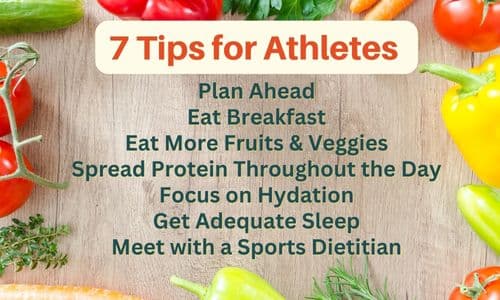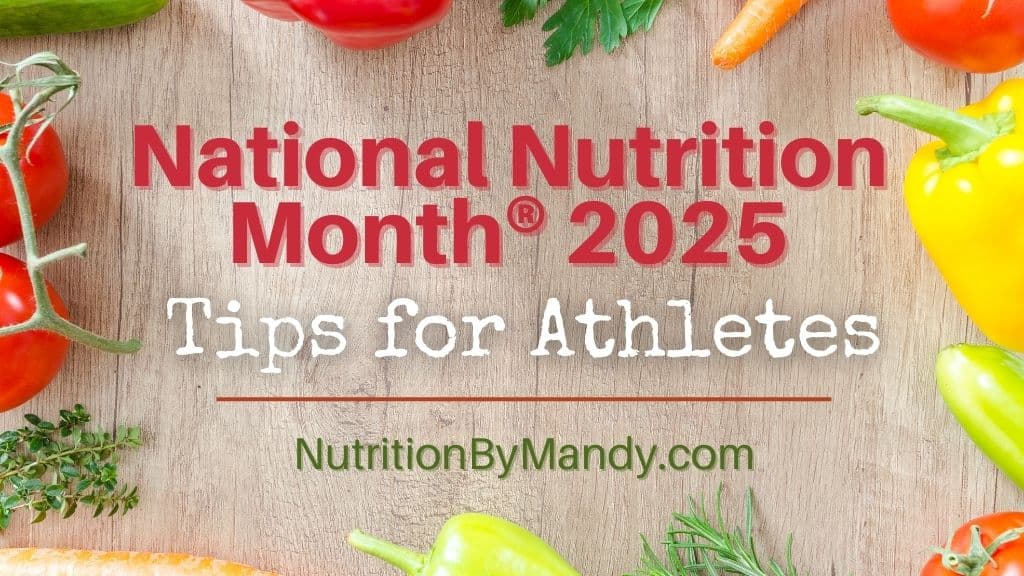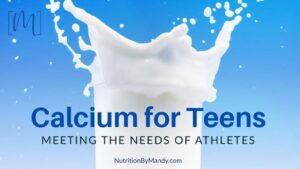Last Updated on February 13, 2025 by Mandy Tyler, M.Ed., RD, CSSD, LD
National Nutrition Month® 2025: Tips for Athletes
During March we celebrate National Nutrition Month®. This month serves as a reminder of the importance of making informed food choices and developing positive eating and physical activity habits to promote a healthy lifestyle.
The theme for National Nutrition Month® 2025 is “Food Connects Us.” The focus of the month highlights how food connects us with our families, friends, culture, and traditions.
In addition, it serves as reminder of the connection between the food we eat and our overall health and well-being.
7 Tips for Athletes During National Nutrition Month® 2025
Let’s take a look at seven ways athletes can make healthy choices this month to help achieve their sports nutrition goals.
Tip #1: Plan Ahead
With busy practice, strength training, and school schedules it is important for athletes to plan meals and snacks in advance to help them meet their sports nutrition needs.
During National Nutrition Month® 2025 consider making time to meal prep. Meal prep can not only save you valuable time during the week, it can also save you money and help decrease food waste.
When considering meal prep, remember you can start small and focus on a single meal or snack to ingredient prep in advance.
If you know you have morning practices, perhaps you want to focus on prepping breakfasts for the week.
Conversely, if you have numerous evening games and practices, then consider prepping meals you can enjoy for dinner when you get home.
Easy meal prep tasks may include:
- Chopping fresh fruit and vegetables
- Packing healthy snacks for the week
- Hard-boiling eggs to have with a grab-and-go lunch
- Prepping rice or pasta to enjoy with an easy weeknight dinner
Tip #2: Eat Breakfast During National Nutrition Month® 2025
Breakfast is commonly referred to as the “Meal of Champions.” However, too often I find athletes skip breakfast in their rush to get out the door in the morning.
If you find yourself commonly skipping breakfast, then commit during National Nutrition Month® 2025 to eat breakfast daily.
Remember, breakfast does not have to be a sit-down meal to be beneficial. I find breakfast on-the-go works well for many athletes.
Consider the following breakfast on-the-go ideas:
- Greek yogurt, frozen berries, granola
- Whole grain bagel, peanut butter, banana, low-fat milk
- Hardboiled-eggs, English muffin, fresh fruit
- Protein overnight oats
- Healthy fruit smoothie
For additional ideas for planning a healthy breakfast, check out my blog: 3 Keys to Building Healthy Breakfasts for Athletes.

Tip #3: Increase Your Intake of Fruits and Vegetables
National Nutrition Month® 2025 is an excellent time for athletes to focus on increasing the variety of fruits and vegetables included in their sports nutrition meal plan.
Fruits and vegetables contain vitamins, minerals, phytochemicals, antioxidants, and fiber making them a healthy addition to your meals and snacks.
When purchasing fresh produce, look for fruits and vegetables that are in-season. When produce is in-season it will be more flavorful and less expensive than out-of-season produce.
Also consider keeping a variety of frozen fruits and vegetables on hand to enjoy throughout the month. Frozen produce is flash-frozen at the peak of ripeness; thus, it maintains a similar nutrition value to fresh.
Many frozen vegetables now come in microwavable bags, thus making steamed vegetables an easy, nutritious addition to your meals. Personally, I enjoy keeping frozen berries on hand to add to oatmeal, yogurt parfaits, and smoothies.
Tips for Eating More Fruits and Vegetables During National Nutrition Month® 2025
Some easy tips to help increase your intake of veggies and fruit during National Nutrition Month® 2025 include:
- Make a smoothie with a variety of berries, sliced banana, and leafy greens
- Top your breakfast cereal with strawberries and sliced bananas
- Pack baby carrots, cherry tomatoes, and mini peppers to take in your lunch
- Enjoy apple slices with peanut butter for a balanced snack
- Add extra vegetable toppings to your sandwiches, grain bowls, and burrito bowls
- Roast vegetables to enjoy with dinners throughout the week
Tip #4: Spread Protein Throughout the Day
Athletes commonly recognize the need for protein in their diet to support the growth and maintenance of lean muscle mass.
However, a key sports nutrition strategy I find many athletes are less aware of is the importance of spreading their protein intake throughout the day.
To get the most benefit from protein intake, athletes are encouraged to spread their protein intake throughout the day with meals and snacks (1).
In regard to the amount of protein to consume, recommendations for athletes are typically based upon the individual’s body weight. Athletes should aim to consume ~0.25 – 0.3 grams of protein per kg of body weight at each eating occasion (1, 2).
In general, this calculates to be in the range of 25-30 grams of protein at each meal/snack. Athletes should also plan to include protein in their post-workout meal to support their recovery nutrition needs.
I find athletes often do well with protein intake at their evening meal, but tend to consume less protein with breakfast and lunch. If this is an area you struggle with, consider making protein intake an area to focus on this month.

Tip #5: Focus on Hydration During National Nutrition Month® 2025
Hydration is important for athletes to support both general health and sports performance.
Even mild dehydration can negatively impact cognitive function and aerobic sports performance. As dehydration becomes more severe, further decreases in performance are seen (3).
In addition, dehydration increases the risk of heat illness, especially when exercising in a hot and humid environment (3).
Hydration needs of athletes vary greatly in regard to both the amount of fluid and electrolytes (namely sodium) lost in sweat. Therefore, having an individualized hydration plan for activity is important.
Consider making time during National Nutrition Month® 2025 to focus on your hydration needs to support performance.

Tip #6: Get Adequate Sleep
Adequate sleep is important for athletes, to support performance as well as overall health and well-being. Unfortunately, sleep is often an area that gets neglected by many athletes.
The American Academy of Sleep Medicine recommends individuals get the following amount of sleep each night (4, 5):
- Youth 6-12 years old: 9-12 hours
- Teenagers 13-18 years old: 8-10 hours
- Adults: 7 hours or more
If you find you are regularly not getting adequate, quality sleep at night, consider focusing on improving your sleep habits this month.
Ideas for positive sleep habits include (6):
- Creating a consistent sleep schedule, going to bed and getting up at the same time (including the weekends)
- Setting-up an ideal sleep environment that is cool, dark, and quite
- Developing a relaxing sleep routine, consider deep breathing, mindfulness exercises, or journaling.
- Limiting the use of electronics before bedtime
Tip #7: Meet with a Sports Dietitian Nutritionist During National Nutrition Month® 2025
National Nutrition Month® 2025 is a great time to arrange an appointment to meet with a sports dietitian nutritionist for athletes.
A sports dietitian nutritionist can assist you with developing a customized meal plan to help you meet your nutrition goals.
In addition, a sports dietitian nutritionist can provide guidance on supplements, help create an individualized hydration plan for performance, as well as work with you on sports specific nutrition strategies to enhance performance.

Ready for National Nutrition Month® 2025
You are now set with 7 ways to make healthy choices to support your sports nutrition goals, health, and overall well-being during National Nutrition Month® 2025. I encourage you to pick an area to focus on and set goals for progress throughout the month.
To learn more about National Nutrition Month® 2025, visit the Academy of Nutrition and Dietetics website.
For additional sports nutrition tips, check out my blog: 9 Essential Items for an Athlete’s Grocery List.
Join the Nutrition By Mandy Email List & Get a Free Weekly Meal Planner Template
Click HERE to join the Nutrition By Mandy e-mail list. When you join you will receive a free weekly meal planner template to download and plan out your meals for the week.
About the Author
Mandy Tyler is a Sports Dietitian Nutritionist in the San Antonio, TX area. She is a Registered and Licensed Dietitian, a Board-Certified Specialist in Sports Dietetics, a Licensed Athletic Trainer, and is a Certified Exercise Physiologist through the American College of Sports Medicine. Mandy has experience working with athletes at the high school, collegiate, and professional levels. She believes the key to reaching one’s full potential, both in everyday life and in sports performance, relies on a healthy nutritional foundation.

If you are looking to take your performance to the next level, make sure to check out my new Sports Nutrition Game Day Guide. This downloadable guide is written to help athletes develop an individualized plan to achieve peak performance on game day.





